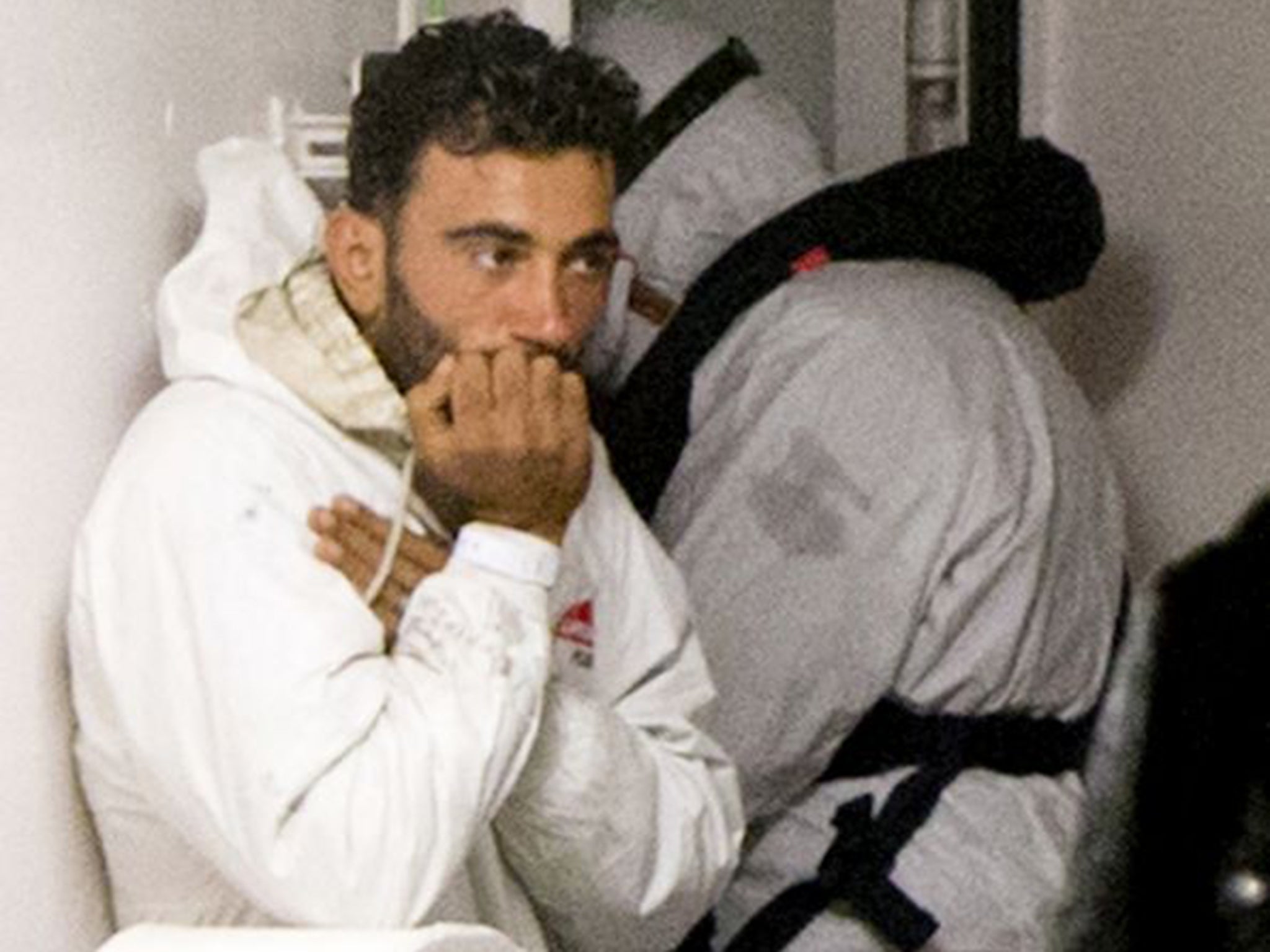Refugee boat disaster captain jailed for 18 years after sinking killed at least 700 asylum seekers
Sinking in April 2015 is believed to be worst disaster in the Mediterranean since Second World War

A Tunisian people smuggler has been jailed for 18 years for causing the worst boat disaster in the Mediterranean since the Second World War.
Mohammed Ali Malek was at the helm of an overcrowded vessel carrying up to 800 refugees that went down between Libya and Italy in April 2015. Judges in Sicily sentenced him to 18 years in prison on Tuesday for manslaughter, human trafficking and causing the disaster, fining him €9m (£7.5m).
Mahmoud Bikhit, a 26-year-old Syrian man accused of being his first mate, was handed a five-year sentence by judges in Catania for “facilitating illegal immigration” and a €9m (£7.5m) fine.
The pair were found to have commandeered a former fishing trawler crammed with desperate migrants, dangerously overloading the vessel before accidentally ramming it into a Portuguese container ship attempting to rescue those on board and causing it to capsize.
Malek and Bikhit were among only 28 people who survived the disaster that killed at least 700 refugees, including many who had been locked in the boat’s hold.
“While getting onto the boat I heard the smugglers say that they were going to try to get 1,200 on to the boat and that’s why they beat us to get us onto the boat,” said Said, a 16-year-old survivor from Somalia.
“But they stopped at 800 because it was full – we couldn’t even move. There was no food or water, the people that were put below were locked underneath.”
The boat got into trouble within hours of departing from the port city of Zuwarah, near Tripoli, on 18 April and started taking on water as passengers started to panic, with some attempting to escape to the deck and those on deck trying to find safety below.
Once in international waters, it sent out a distress call and Italian commanders dispatched the Portugese King Jacob container ship to help.
Its crew attempted to steer the ship to avoid collision and switched off its engines, but its captain said the refugee boat suddenly increased speed and smashed into its port side. The trawler swiftly lost balance and overturned. In less than five minutes it sunk.
Malek claimed he was “neither a criminal nor a murderer” in a letter to the BBC, claiming an unidentified African man had been steering the boat and blaming the King Jacob for causing the collision and sinking.
But officials in Sicily put the capsizing down to Malek’s steering of the trawler into the cargo ship and the panicked movement of passengers after the crash.
Speaking last year, Catania prosecutor Giovanni Salvi stressed that none of the Portugese crew were under investigation and that their attempts to help the ship in distress “in no way contributed to the deadly event”.
In pictures: Migrant boat disaster
Show all 10A 32-year-old Bangladeshi man, the first survivor to arrive in Sicily, said: “I and the others managed to survive because we were outside, but many of the others remained prisoners in the hold of the boat because the traffickers had locked them in and they finished at the bottom of the sea.”
Volunteers who joined the recovery effort described finding children’s bodies, shoes, life jackets and backpacks floating in the water.
It was the second disaster that week in the Central Mediterranean, following another sinking where more than 400 migrants drowned.
The successive tragedies drove calls for Europe to provide refugees from across the Middle East and Africa with safe passage to the continent but early rescue efforts have largely morphed into missions targeting smugglers, with humanitarian rescues a secondary objective.
Shortly after the April disasters, the main refugee route switched to the comparatively shorter and safer crossing over the Aegean Sea from Turkey to Greece.
But attempts by authorities to close the passage with the controversial EU-Turkey deal have made the treacherous Central Mediterranean crossing, now the deadliest in the world, the dominant passage for those fleeing war and persecution.
A record of more than 4,700 migrants and refugees have been killed attempting to reach Europe so far this year, with 350,000 reaching the shores of Italy, Greece and Spain.
Subscribe to Independent Premium to bookmark this article
Want to bookmark your favourite articles and stories to read or reference later? Start your Independent Premium subscription today.

Join our commenting forum
Join thought-provoking conversations, follow other Independent readers and see their replies